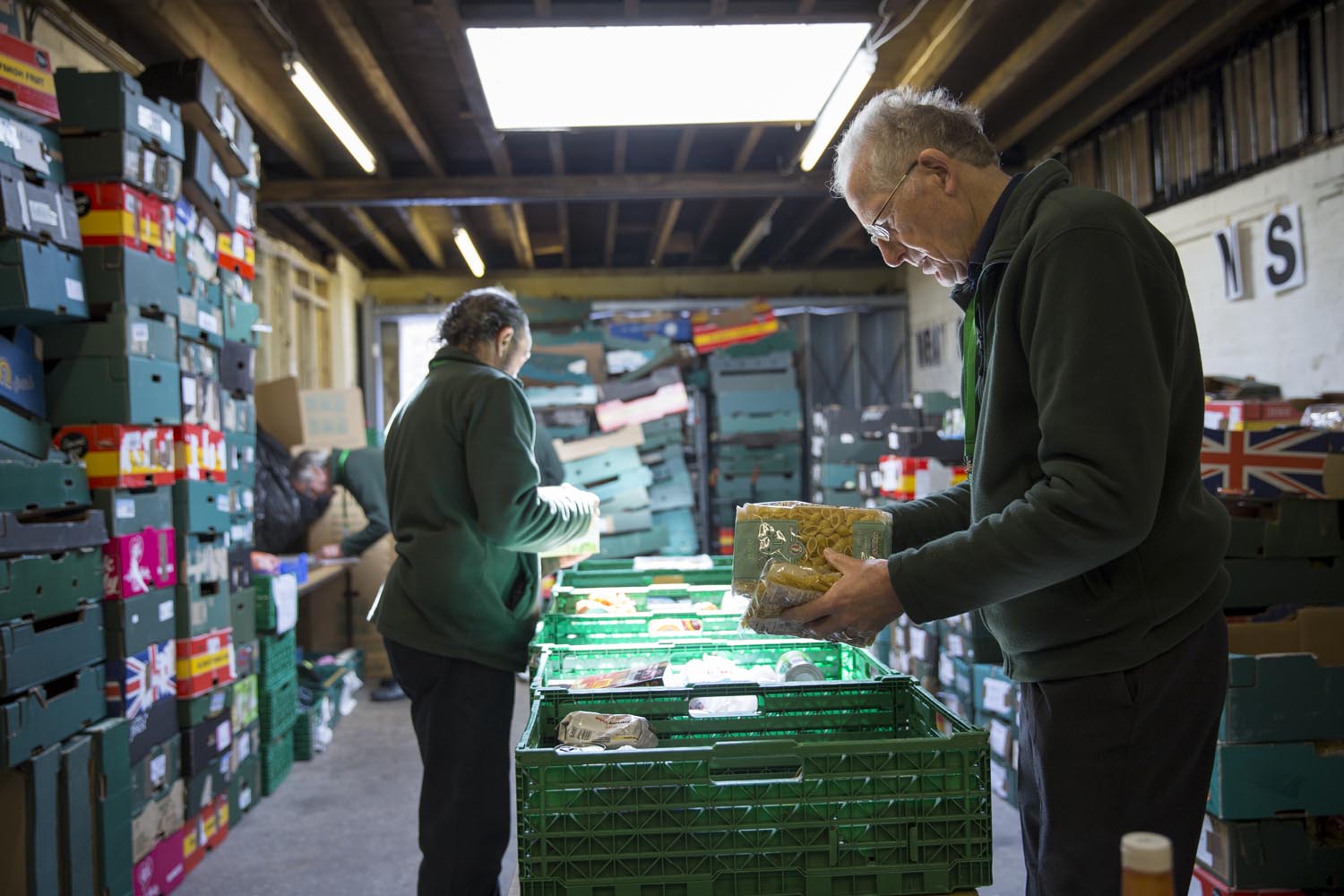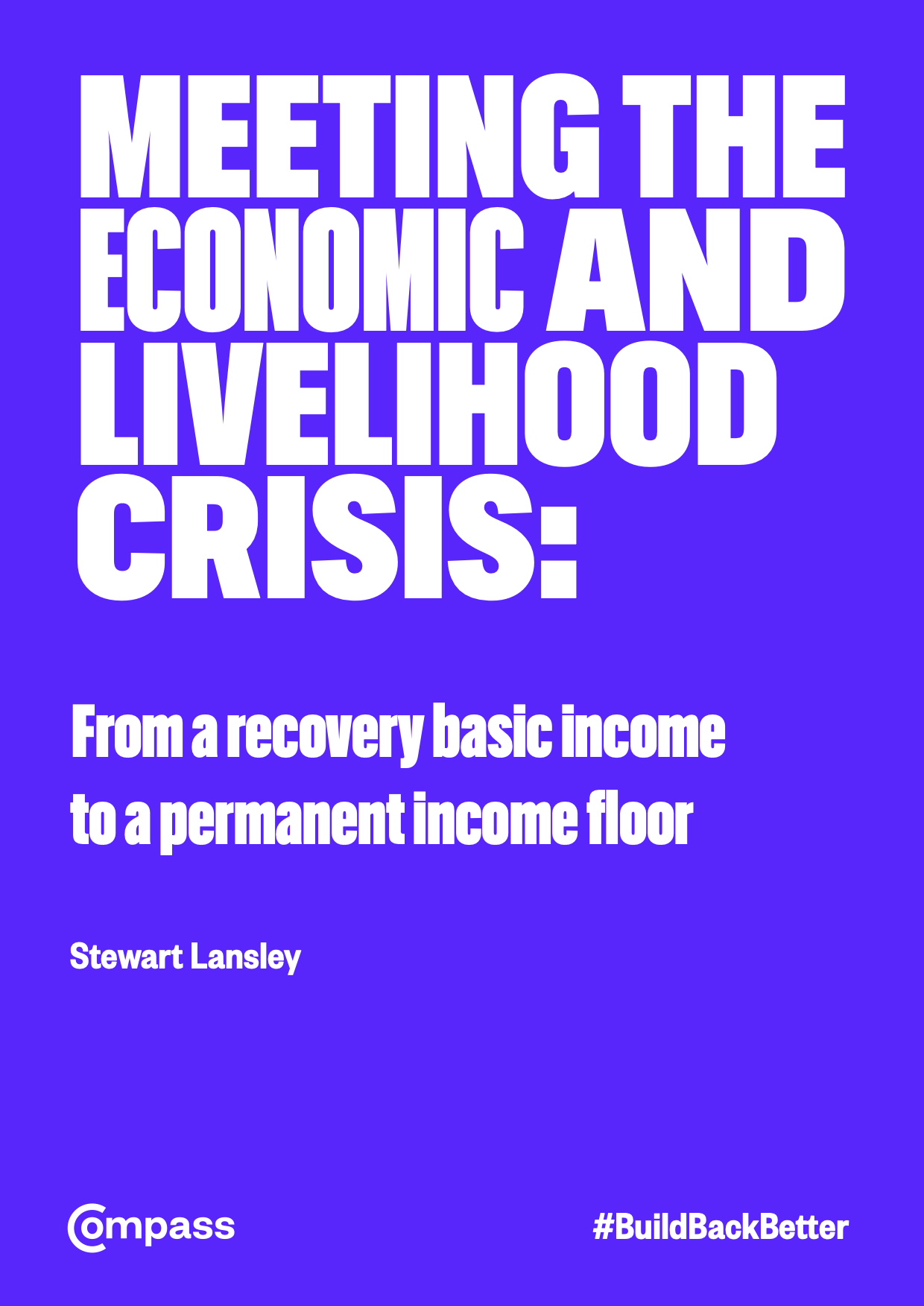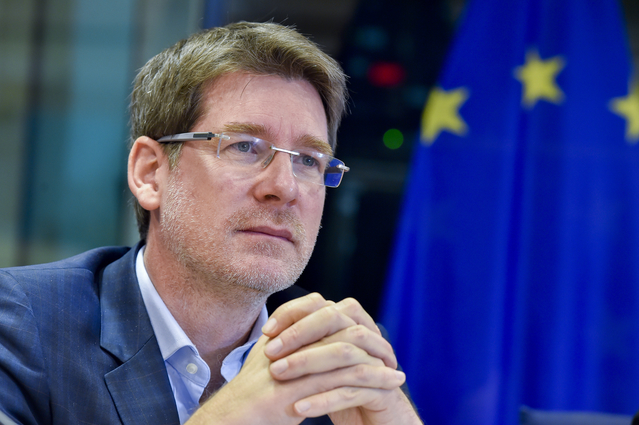Want to keep up-to-date with our coronavirus coverage? Sign up to our newsletter.
Talking Points: April 2020
Posted on 06 May 2020 Categories: Blog, Climate crisis, Coronavirus, Local initiatives, New economic models, Talking Points, The business we want
by Rethinking Poverty
Life continues to be dominated by coronavirus. This month’s Talking Points focuses mainly on the all-important question of ‘what next?’ Has the market economy had its day? Will we seize the opportunity for a green recovery? What would a post-growth economy look like? It also looks at the effect of the virus on inequality and growing calls for a guaranteed minimum income.
Coronavirus: exacerbating inequality
The virus doesn’t discriminate between people: Prince Charles got it, so did Boris Johnson. Such comments have been unthinkingly bandied about. It is clearly untrue – the virus affects poor people living in crowded conditions and having still to travel to work more than wealthier people. This is even more true of ‘the accompanying economic shock’, says Torsten Bell of the Resolution Foundation. The fallout from the pandemic threatens to expose — and widen — inequality in brutal fashion. ‘Before covid-19 hit, Boris Johnson’s plan was to “level up” poorer communities. The opposite is happening.’
Just three weeks into the lockdown, the Food Foundation said that 1.5 million Britons reported not eating for a whole day because they had no money or access to food. One-third of key workers earn £10 an hour or less, according to a new study by the Institute for Fiscal Studies. Some areas of the UK are likely to be much harder hit than others, with tourism hotspots hit particularly badly. According to figures from England and Wales published by the Office for National Statistics on 1 May, the most deprived areas had more than double that of people in the least deprived areas.

The wealthy, by contrast, seem set to come out on top. In the US, nearly 82 per cent of the benefits from the tax law change that is part of the US coronavirus stimulus looks likely to go to people making $1 million or more annually in 2020. In the UK, OpenDemocracy economics editor Laurie Macfarlane believes that bailout money will mostly end up with those who already have most, with much of the money paid by the government going straight out in rent, mortgage payments, debt payments, etc – ie to protect the incomes of asset holders.
‘Let’s stop pretending billionaires are in the same boat as us during this pandemic,’ says Chuck Collins. Between 18 March and 10 April, over 22 million Americans lost their jobs. Over the same three weeks, a new study for the Institute for Policy Studies showed that US billionaire wealth increased by $282 billion – an almost 10 per cent gain.
A strong case for an income guarantee
In the final two weeks of March, almost 1.5 million people in the UK applied for universal credit – ten times the usual number. In the view of NEF senior economist Sarah Arnold, universal credit is not fit for purpose. Even with recent modest increases, ‘it cannot keep people from hardship’. What is needed, she says, is a minimum income guarantee, more generous at around £200 pw excluding rent, and available quickly to every adult not currently benefiting from existing government schemes.

OpenDemocracy has been calling for a Liveable Income Guarantee, while Compass has published a pamphlet calling for a recovery basic income, to be followed by a permanent basic income. ‘A permanent scheme would provide, for the first time, an income floor – a robust safety net under the existing benefit system.’ On 21 April, 110 MPs and peers from seven parties called on the Chancellor to introduce a Recovery Universal Basic Income.
Isn’t this the moment to introduce a universal basic income (UBI)? A minimum income standard is more feasible than universal basic income, argues Rory Macqueen. Many people’s incomes are now guaranteed under other schemes, and in any case the government lacks the information needed to make immediate payments to all UK adults. In addition, a minimum income guarantee ‘highlights the need for a permanently stronger social security net – one that is humane to those who lose their jobs under all circumstances, without seeming impossible or utopian’.
Coronavirus: community response
The huge community response to the crisis, highlighted in last month’s Talking Points, has been amply documented. ‘The famously standoffish British are no longer bowling alone,’ writes Patrick Wintour. Recognition of the importance of social capital comes from an unexpected quarter. ‘Even as other capital has crumbled,’ writes Andy Haldane, chief economist of the Bank of England, writing for the Financial Times, ‘the stock of social capital has risen, acting as a counter cyclical stabiliser across communities … We need to invest in the rich endowment of social capital created by the crisis, by rethinking and rebuilding the institutional immune system that is our social sector.’
Coronavirus: business response

Businesses have responded in different ways to the crisis. In the early stages, businesses jumped in with offers to support healthcare workers and manufacture much-needed supplies. Later, groups of businesses began to come together to consider the need to build back better. On 14 April, the ‘European Alliance for Green Recovery’ was launched, with CEOs of 37 of Europe’s biggest global companies joining ministers from 11 countries (as of 20 April, this number had grown to 13) and MEPs, business associations and trade unions to call for a green recovery in Europe. The businesses are members of We Mean Business, a global non-profit coalition working with the world’s most influential businesses to take action on climate change. And, of course, some businesses have responded badly …
One loser: the free market?
‘There will be no going back,’ according to CLES. ‘The free market, as John Maynard Keynes once put it, is “not intelligent, it is not beautiful, it is not just, it is not virtuous — and it doesn’t deliver the goods”. How true these words are today. How vital it will be to remember them as we attempt to build a better future.’
‘Perhaps one of the greatest impacts of the crisis has been the demonstration effect of what governments and the broader public sphere are capable of,’ writes Andrew Simms. ‘… it is the public domain that holds us all together, and enables us first to survive and, when better maintained, to thrive.’
Even Mark Carney seems to be turning against the market economy. The economy must yield to human values, he says, writing for the Economist. ‘In recent years, the market economy has become the market society. The virus could reverse that trend.’
George Monbiot, however, still has some use for the market. If governments are not willing to buy up dirty industries like the oil, airline and car industries and turn them towards clean technologies, they should ‘let the market decide. In other words, allow these companies to fail.’
An appetite for change
There seems to be public appetite for change. In his article #BuildBackBetter, Barry Knight concludes, following online group discussions with more than 80 people from universities and civil society organisations from all over the world: ‘we face a choice between trying to rebuild the systems we had or building new ones. In our discussions, we have not found anyone who would like to go back to the way the world was. People want to “build back better”.’
On 22 April the Guardian reported on a new opinion poll showing that 66 per cent of Britons believe the climate is as serious a long-term crisis as Covid-19 and 58 per cent agree it should be prioritised in the economic recovery. A survey of 14 countries by Mori found even higher levels of support.
A green recovery
That same article reports UN secretary general, António Guterres, declaring the pandemic to be the biggest threat the world has faced since the second world war, but he said the environmental emergency was deeper. Post-pandemic recovery should focus on six goals, including the creation of clean, green jobs and taxpayer support for sustainable growth. IMF chief Kristalina Georgieva has also been urging governments to direct money to rebuild after the public health crisis into green investments and not subsidise fossil fuels.
‘Out of the coronavirus crisis, a new kind of Britain must be born,’ writes John McDonnell. If we are to face ‘the existential threat to human existence from the climate crisis, we need to rebuild our society post-Covid-19 not with another decade of austerity, but with a decade-long programme of intensive investment in our social and physical infrastructure to end our dependency on fossil fuels once and for all, and construct a green economy.’
Greta Thunberg, too, has urged people around the world to take a new path after the coronavirus pandemic, which she said proved ‘our society is not sustainable’. ‘The strong global response to Covid-19 demonstrated how quickly change could happen when humanity came together and acted on the advice of scientists,’ she said. Climate organisation 350degrees.org has set out five principles for a just recovery.

‘We don’t want to bounce back to a January 2020 economy when half the country lived paycheck to paycheck; unchecked carbon pollution endangered our future; and racial inequalities made people of color so vulnerable to disease,’ say Daniel Aldana Cohen and Daniel Kammen. ‘Rather, by deploying a Green Stimulus that centers workers and communities, we can bounce forward together.’ ‘But please let’s stop describing it as a stimulus package,’ pleads George Monbiot. ‘We have stimulated consumption too much over the past century, which is why we face environmental disaster. Let us call it a survival package, whose purpose is to provide incomes, distribute wealth and avoid catastrophe, without stoking perpetual economic growth.’ In a recent webinar, Naomi Klein makes a forceful case for a global green new deal, fighting climate change and poverty and inequality together.
Post-growth economic thinking
The end of growth is painful, says Richard Heinberg. But the coronavirus pandemic has ‘seismically shifted the discussion’. Suddenly the first priority of world leaders is no longer economic growth; instead, it is public safety. He goes on to survey a range of post-growth economic policies, including universal basic income, gross national happiness, the green new deal, resilience and localism. Local Futures also argues for a degrowth perspective. The covid-19 crisis is not degrowth, but covid-19 shows that degrowth is needed, and ‘the potential for a societal transformation to a degrowth future’. Local Futures have set out eight principles for post-Covid reconstruction, including local ownership, local investment and economic diversity. In a ‘wakeup call for local resilience’, they advocate producing ‘more of our basic needs either at home or closer to home’. Thus ‘we can reduce the worst impacts of globalization and centralization … and increase the chances that humans and other life forms will survive over the long term.’
Posted on 06 May 2020 Categories: Blog, Climate crisis, Coronavirus, Local initiatives, New economic models, Talking Points, The business we want
